Middlesbrough: Refugee footballers finding freedom with Club Together
- Published
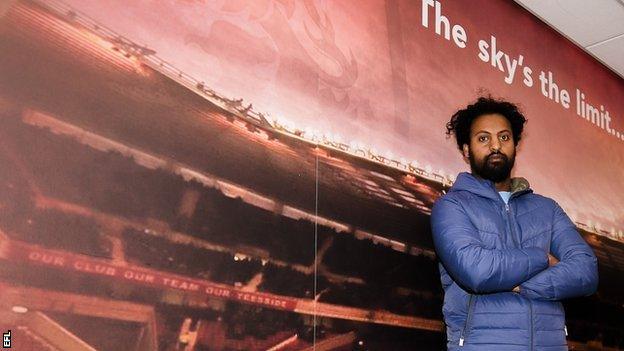
Yonas Tesfatsion was one of the first refugees to feature for Middlesbrough's Club Together team, and now he works as a volunteer with Boro's foundation
"When you run away from your country, you have nothing."
When Yonas Tesfatsion fled Eritrea he left behind all his possessions, a career in education and the pride of playing top-flight football in the country of his birth.
He had to travel through the Sahara desert and then brave the perils of a Mediterranean crossing before continuing overland through France and eventually to England.
He arrived in Middlesbrough with nothing - no family, no friends, just the clothes he wore. The town was a haven and its football club a sanctuary, somewhere he could hope to build a new life.
Then he joined Club Together - a team of refugee and asylum seekers set up by Middlesbrough's foundation in conjunction with local charity, Methodist Asylum Project - acquiring in the process a pair of football boots, a Boro shirt, and a sense of camaraderie.
"I wasn't safe in my own country so I decided to flee," the 29-year-old told BBC Sport. "I had nothing, just myself.
"The journey was very difficult - it was a life-or-death situation sometimes - but it is by the miracle of God that I finally made it here.
"We are different people from different societies, different cultures and speaking different languages, but football knows no language. You go and play. Here, we enjoy it."
Tesfatsion is among the estimated 12% of Eritrea's population to have fled the country because of repression and poverty, according to United Nations data and Human Rights Watch., external
In 2015, when he escaped, the UN estimated about 4,000 people were leaving the country every month.
Recalling his former life in Africa and the journey to England remains difficult for the former physical education teacher.
But as he stands on the indoor pitch at Middlesbrough's Rockliffe Park training base, in the quiet village of Hurworth, in County Durham, he speaks often about "appreciating" where he now is.
I owe my career to being the son of refugees - Besic

Muhamed Besic, on loan at Middlesbrough from Premier League club Everton, featured for Bosnia-Herzegovina at the 2014 World Cup
In the middle of the pitch is Champions League winner John Mikel Obi, flanked by three of his Middlesbrough team-mates, Muhamed Besic, Lewis Wing and George Saville.
The quartet join 13 Club Together players for training drills overseen by first-team coach and former Boro defender Curtis Fleming.
Combative midfielder Besic knows, with every pass, laugh and handshake, what impact he can have on the group made up of men from Somalia, Sri Lanka, Afghanistan, Palestine, Libya, Iran, Syria, Eritrea and Ethiopia.
The Germany-born Bosnia-Herzegovina international is himself the son of refugees - his parents and grandparents having left their homeland before the Yugoslav federation disintegrated and war broke out in Bosnia.
"I know how it is making a new start," Besic told BBC Sport.
"If my parents weren't refugees, I wouldn't be here. In Germany I became a footballer. In Bosnia I probably couldn't have been because there are not the same opportunities."
For Besic, his interest went beyond the mini-training session and football chit-chat, as he learned that English lessons delivered as part of the Club Together programme have helped get participants into college and set them up for volunteer work.
"You appreciate a lot of things when you hear stories and grow up like this, your grandfather telling you how it was from when you are small," Besic said.
"My grandfather and grandmother needed time to find jobs and stuff like that. Already, after a year, these people have places in college.
"It is a big thing to get into college, to get a job. Even a day like this can give a boost in life and something big come from it, maybe in school or in football.
"People can underestimate the importance of making people happy in life."
'Safe and free in Middlesbrough'
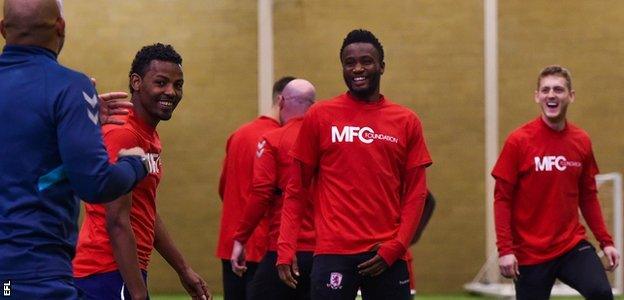
John Mikel Obi was among the four Middlesbrough players to join in the Club Together training session to help promote the initiative and the English Football League's Day of Action
Besic was the first player to shake hands with the refugee footballers as they enter the dressing room at Middlesbrough's multi-million pound training facility.
For those who escaped to England for a new start, the programme has provided much more than just a day trip and an opportunity to mingle with stars of the professional game. For many, it has helped establish a connection to where they now live.
Club Together, whose work is being highlighted as part of the English Football League's Day of Action - when all 72 clubs in the Championship, League One and League Two demonstrate the positive impact football can have in the community - was formed at a time when Middlesbrough was the only place in the UK to exceed limits on the number of asylum seekers taken in.
There was also controversy about doors in the city being painted red, identifying where asylum seekers lived - revelations that led to a government investigation, which determined that what happened had been "inadvertent".
Tesfatsion himself had a red door, which was later painted a different colour. However, he stressed that he - unlike others - has never faced problems in the town.
"Here I'm safe and free," he said.
Helping the city's influx of new arrivals to find that "sense of belonging in the community" is why Club Together was formed.
"Middlesbrough was getting more than its fair share of refugees and asylum seekers," said Paul South, health co-ordinator at Middlesbrough's foundation.
"As a charity we thought it was only right that we helped show how Middlesbrough was an inclusive and welcoming place."
It started with asylum seekers signing up to play in an inclusive tournament in the Tees Valley area hosted by Boro, led to the club running health sessions, and evolved into the programme and team it is now. They have even gone on to play in competitions made up of similar sides from across England.
"It has organically grown over three years," said South of a programme that attracts about 40 men over a number of weekly sessions.
'We see them as Boro fans first'
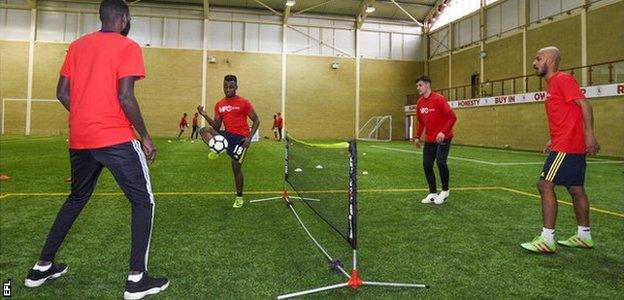
The Club Together programme offers participants an opportunity to improve both their English language skills and their football ability
Tesfatsion was at that first tournament, playing in a pair of jeans and t-shirt. Football boots, shirts and shorts were luxuries he couldn't afford - and something Boro would later donate.
He left Eritrea a footballer, having played in his country's top flight - a league he stresses is a million miles away from the riches and professionalism of England's set-up - and has gone on to help give a team of displaced people an identity thousands of miles away from their homelands.
His skills as an interpreter and background in sports education were quickly put to good use.
"Yonas is a great guy and he has come full circle with the foundation," said South.
"He is key in his community, has helped us as an interpreter, is a great organiser and gets the guys together for tournaments and games.
"It's really fulfilling to see where so many have come from to where they are now.
"Rather than see people as refugees and asylum seekers we see them as Boro fans and football fans first. To be able to see the joy and enjoyment when they come to the sessions is amazing really."
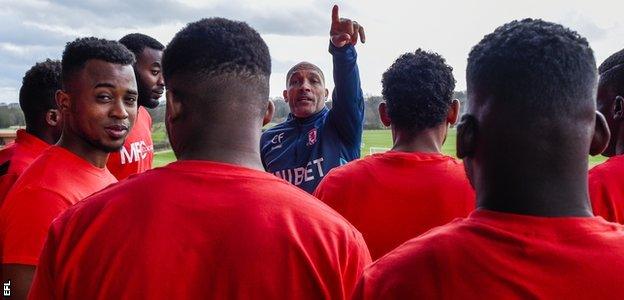
Middlesbrough coach Curtis Fleming gave the Club Together players a tour of the club's Rockliffe Park training base
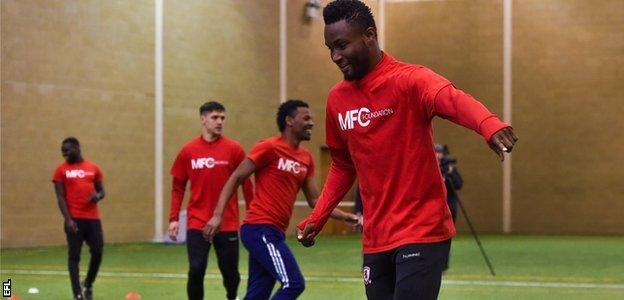
John Mikel Obi was popular with the Club Together participants, as a number are fans of Chelsea - a club the Nigeria international helped to Champions League success in 2012